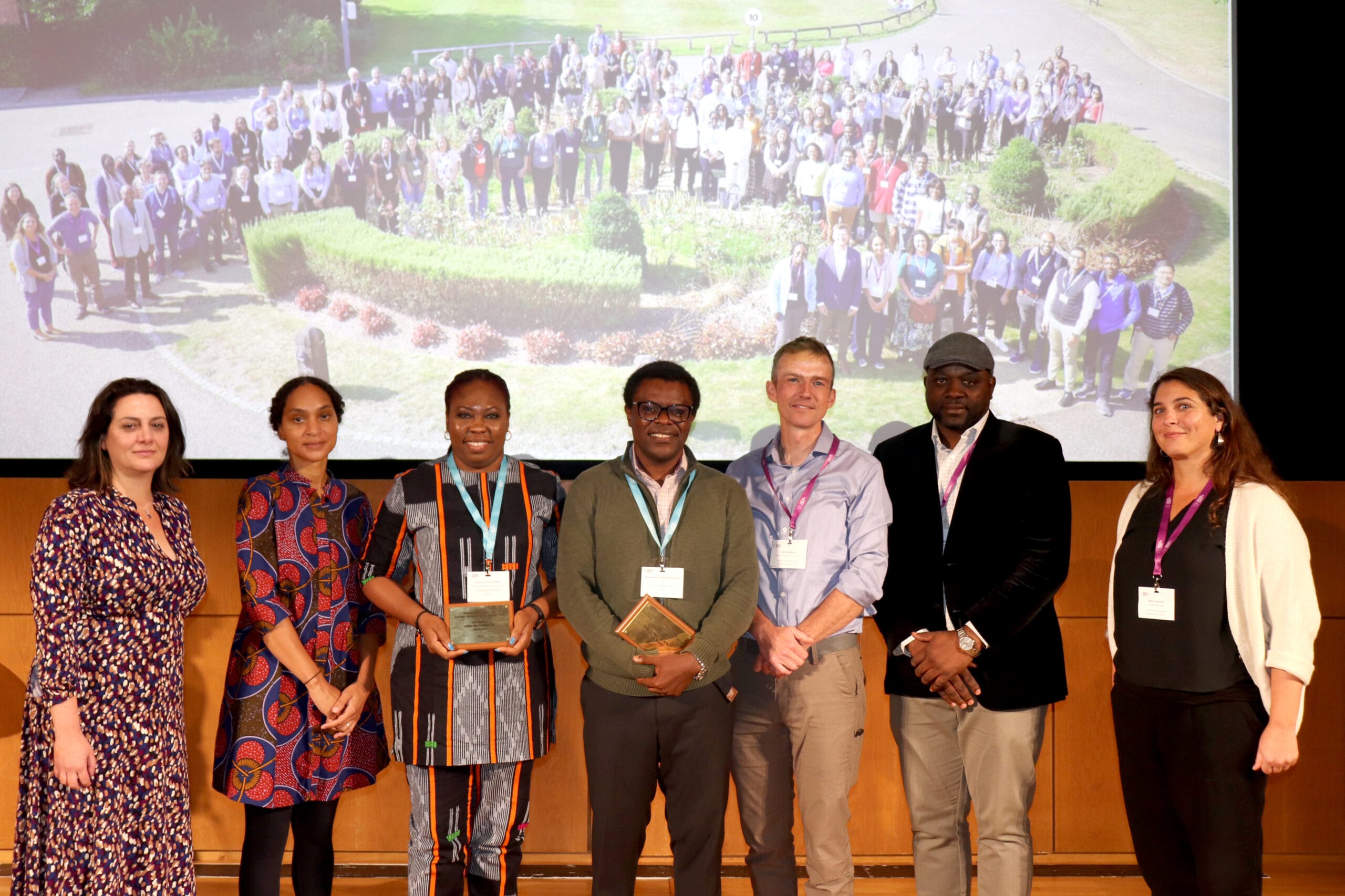Named in honour of the late Professor Dominic Kwiatkowski, an early pioneer in genomic data harmonisation and a champion for malaria research in endemic regions, this award acknowledges both past achievements and future potential in advancing genomic approaches to malaria control.
At the 9th GEM Conference, we had the opportunity to interview the two 2024 awardees, who shared their insights on the evolving landscape of malaria genomics and their hopes for the future of the field.

Dr Eniyou Cheryll Oriero
 Eniyou’s malaria genomics journey began during her post-doctoral fellowship, focusing on non-falciparum malaria species like Plasmodium ovale and Plasmodium malariae in West Africa. With a background in molecular diagnostics and epidemiology, her work transitioned into malaria genomic surveillance when she joined Professor Alfred Amambua-Ngwa’s team at the MRC Unit The Gambia at LSHTM. She now leads and coordinates various aspects of the NIHR project to establish and scale up genomic sequencing capabilities in West Africa to provide public health authorities in the region with timely information on malaria parasites.
Eniyou’s malaria genomics journey began during her post-doctoral fellowship, focusing on non-falciparum malaria species like Plasmodium ovale and Plasmodium malariae in West Africa. With a background in molecular diagnostics and epidemiology, her work transitioned into malaria genomic surveillance when she joined Professor Alfred Amambua-Ngwa’s team at the MRC Unit The Gambia at LSHTM. She now leads and coordinates various aspects of the NIHR project to establish and scale up genomic sequencing capabilities in West Africa to provide public health authorities in the region with timely information on malaria parasites.
For Eniyou, the biggest difference between the discovery research she was doing before and the malaria genomic surveillance she’s involved with now is the emphasis on real public health impact. “We’re working with the National Malaria Control Programme, listening to them, hearing what they want, and providing results in line with what they are interested in,” she says.
When it comes to training and capacity building for malaria genomics, Eniyou believes in bringing the solution close to the problem. “To do that, we need to train more people in endemic countries.” This is the cornerstone of her vision for advancing malaria genomic epidemiology in Africa over the next decade and well into the future.
Malaria is an incredibly adaptive disease, and it’s still full of surprises. This is what makes it a formidable challenge. As Eniyou says: There’s so much complexity... even just looking at the parasite, it has mutations and the ability to adapt, and often you don’t catch it in real-time. This is why we need genomics."
Read Eniyou's idealistic vision for the next ten years of malaria genomics
Genomic epidemiology of malaria has evolved rapidly within the last two decades, in line with technological advances in molecular biology, data analysis, and computing power. The release of the first Plasmodium genome sequence at the beginning of this period was key to unlocking new ways of interrogating the malaria parasite biology, population structure, survival, and adaptation strategies. My idealistic vision for malaria genomic epidemiology in the next 10 years builds on current knowledge and the reinforced effort toward malaria elimination. Key areas I anticipate being at the core of future global malaria genomic epidemiology activities are described below.
Genomic data generation and analysis: Current platforms for generating data for malaria genomic epidemiology include whole genome and targeted amplicon sequencing on various next-generation sequencing platforms. Research activities to improve the sequencing chemistries and enable high throughput generation of genomic data in resource-limited settings will be important to take malaria genomic epidemiology forward within the next decade. An insight into the true extent of the diversity and complexities represented in the global malaria parasite population is an important aspect that will play a role in our understanding of Plasmodium genomic interactions. This will require sequencing a lot more malaria parasite than is being done currently. Integrated research approaches that will study the malaria parasite population together with its human and vector hosts will also be centre stage for future malaria genomic epidemiology. Along with more sequencing of the parasite and host genomes arises the challenge of data storage and analysis, therefore research on new data formats and analysis pipelines will be developed to integrate the anticipated large number of sequences and other Omics datasets generated.
Access and availability of malaria genomics data for public health use: The ultimate goal of malaria genomic epidemiology is to generate knowledge and evidence that will inform policy and practice concerning malaria. Therefore, within the next decade, simpler and easier ways of presenting and sharing malaria genomic data with relevant stakeholders such as government staff in ministries of health and national malaria programs, as well as study participants and individuals in malaria-endemic communities will be sought to encourage uptake of research outputs from malaria genomic epidemiology.
Research on parasite and host adaptations following mixed or layered interventions: Novel strategies for malaria prevention, control, and elimination including implementation of the newly licensed malaria vaccines alongside interventions for chemoprevention, treatment, and vector control will create a complex genetic interplay that will be the heart of core malaria genomics research agenda in the next decade. An understanding of the parasite biology and its adaptations to various selection pressures, including those from the host immune systems and environment factors (drugs, vaccines and insecticide) will be mainstream in malaria genomics research. The impact of the vaccines on the human populations and disease status will also be part of the future malaria genomic epidemiology.
New tools to interrogate the “malariome” (parasite, host and vector genomes): Technological advances such as the use of artificial intelligence (AI) will be leveraged in the short-term future of genomic epidemiology research, to develop novel tools that will help to study the complex interactions of the three genomes involved in malaria. I anticipate that AI simulations will be employed to generate biological models to study and predict malaria parasite recombination, transmission dynamics, and the impact of interventions administered.
Dr Moses Ikegbunam
 Moses is a researcher and lecturer at Nnamdi Azikiwe University in Nigeria. With nearly a decade of experience in infectious diseases and drug resistance research, his work has centred on understanding the genetic diversity and resistance profiles of malaria parasites, particularly in his home country. His educational background, which includes a PhD in pharmaceutical biotechnology and expertise in microbiology, has equipped him to address one of the most pressing challenges in malaria control – drug resistance.
Moses is a researcher and lecturer at Nnamdi Azikiwe University in Nigeria. With nearly a decade of experience in infectious diseases and drug resistance research, his work has centred on understanding the genetic diversity and resistance profiles of malaria parasites, particularly in his home country. His educational background, which includes a PhD in pharmaceutical biotechnology and expertise in microbiology, has equipped him to address one of the most pressing challenges in malaria control – drug resistance.
Through his work, Moses has already made significant strides in understanding the genetic diversity and resistance patterns of malaria parasites. "In Nigeria, our genomics research is providing insights about artemisinin resistance and delayed parasite clearance," he explains. “Resistance can cripple our current treatment options, so through genomic epidemiology, we can ensure that Africa is protected against emerging resistance.”
Looking to the future, Moses is optimistic about the potential that new tools and advancements in genomic technologies will bring to malaria control. "In some regions, it is possible to successfully eliminate malaria by coupling genomics insights with comprehensive public health efforts," he says.
Even with these promising developments on the horizon, he stresses the urgency for more genomics-centric research in Africa. "We need to sequence more parasites across endemic regions to gain better insights into the population structure and resistance strains," he notes, calling for increased investment in local genomic surveillance initiatives. His lab is already part of the Nigerian consortium for genomic surveillance, which he says is a step in the right direction for the country that is the hardest-hit by malaria. However, he affirms that more efforts are required to ensure the sustainability of malaria genomic surveillance.
As he stressed in his application for the GEM award, Moses’ vision has a clear call to action: Malaria is not present globally but it has a global impact. We now need comprehensive attention on the issue and the focus should be on becoming more proactive in tackling outbreaks by leveraging genomics.”
Read Moses' idealistic vision for the next ten years of malaria genomics
In 2034, my vision for genomic epidemiology of malaria is a beacon of hope in the relentless battle against this deadly disease. Through the lens of genetics, I envision a future where interventions will be finely tuned to the specific genetic makeup of the malaria parasite, ensuring treatments are not just effective but tailored to combat resistance. I envision a global surveillance system powered by genomic insights, will vigilantly monitor the genetic diversity of malaria strains, enabling swift responses to emerging threats like drug resistance. Individualized treatment plans based on geneticprofiles will become the norm, maximizing efficacy while minimizing side effects. Vaccines, developed with insights from genomic data, will offer robust protection against the disease.
In some regions, malaria will have been successfully eliminated, a testament to the power of genomic insights coupled with comprehensive public health efforts. Collaboration and data sharing will be the bedrock of progress which allows researchers worldwide to unite their resources and expertise, ensuring that advances in genomic epidemiology transcend borders.
But this future will not merely be reactive; it will be proactive. Advanced predictive models, fueled by genomic insights, will serve as sentinels, alerting us to potential outbreaks before they occur. Integration of genomic data seamlessly into existing health systems will empower healthcare providers and public health officials to allocate resources efficiently and improve patient outcomes. Communities will be active participants in this endeavor, empowered by their understanding of the genetic basis of the disease. Local initiatives, informed by genomic insights, will be tailored to the unique needs and challenges of each community, fostering a sense of ownership and sustainability in malaria prevention and control efforts.
Genomic epidemiology will extend beyond human and parasite genomes to encompass the genetic analysis of mosquito vectors and environmental factors influencing malaria transmission. This holistic approach will provide a comprehensive understanding of the complex interactions driving malaria dynamics, guiding the development of innovative control strategies. Amidst these advancements, ethical considerations will remain paramount. Robust frameworks will govern the responsible use of genomic data which will ensure equity, transparency, and respect for individual rights and privacy.
In 2034, genomic epidemiology of malaria will transcend being merely a scientific field; it will become a transformative force, propelling us closer to a world where malaria is consigned to the annals of history. Additionally, advancements in technology will further revolutionize the field of genomic epidemiology. High-throughput sequencing techniques will continue to become more affordable and accessible, allowing for rapid and widespread genomic surveillance of malaria parasites and their vectors. This will enable researchers to track the evolution and spread of drug-resistant strains with unprecedented accuracy and speed.
Furthermore, artificial intelligence and machine learning algorithms will play a crucial role in analyzing the vast amounts of genomic data generated by surveillance efforts. These algorithms will be able to identify patterns and correlations that might otherwise be missed by human researchers, leading to more effective strategies for malaria control and prevention.
Moreover, advancements in gene editing technologies such as CRISPR-Cas9 will open up new possibilities for combating malaria. Researchers will be able to precisely target and modify genes in both the malaria parasite and its mosquito vector, potentially rendering them unable to transmit the disease. This could lead to the development of novel genetic control strategies that complement existing interventions such as insecticide-treated bed nets and antimalarial drugs.
In conclusion, my idealistic vision for genomic epidemiology of malaria in 2034 is one of hope and promise. With advances in technology, international collaboration, and a commitment to ethical and equitable practices, we have the tools and the knowledge to make significant strides towards the control and ultimately the eradication of malaria.
By harnessing the power of genomics, we can bring an end to this ancient scourge and ensure a healthier and more prosperous future for generations to come.


